
Web Hosting Guide | How to Host a Website in 2026?
Web Hosting Tips Updated on : December 31, 2025Summary: This article presents a detailed web hosting guide, including the different types, the advantages, and the disadvantages. It also gives a fair idea of the elements of a good web host and how one can choose the right hosting service.
Web hosting is a buzzword in 2026, which might sound complicated and technical. It is, in fact, a very simple concept. It is simply renting space on a server that connects a website to the internet. Without a web host, a website cannot be made available to the public. Be it for a small one-page website or a large complex online store, web hosts form the backbone of the business.
While the global web hosting industry was valued at USD 90.64 billion in 2018, it is said to hit over a whopping USD 216 billion by 2026. – Source
What is Web Hosting?
Hosting is the home of any website. At the early stages of creating a website, the files are only stored on a web designer’s computer, not on the internet. The next step would be for all web files to be uploaded on the server, which is connected to the internet. This enables people to view the website. Renting space on the internet through a company is called web hosting. There are several types of web hosting like dedicated servers, shared hosting, and virtual private services. Each of these has pros and cons and is best suited for specific kinds of websites.
Why Do You Need a Web Hosting?
Web hosting has various components – both hardware and software. It can get tricky for a business organization to buy all the equipment and then maintain them. Technical glitches are also very common in web hosting. Moreover, the hardware and software can cost a lot of money and the configuration process can also be lengthy. These servers have to run 24*7 and use a lot of resources. For convenience, it is recommended that web hosting companies be hired for the process.
Hiring the best web hosting company will not only help the website with the best features but also make sure it is less time-consuming and cost-effective for the business organization. If the organization is not hosted by a web hosting company, it is also possible that more employees are hired to maintain the servers or to develop them. Hence, for a better uptime guarantee, better speed, and better customer satisfaction, a website owner must invest in a good web hosting guide company.
How Can You Benefit From Web Hosting?
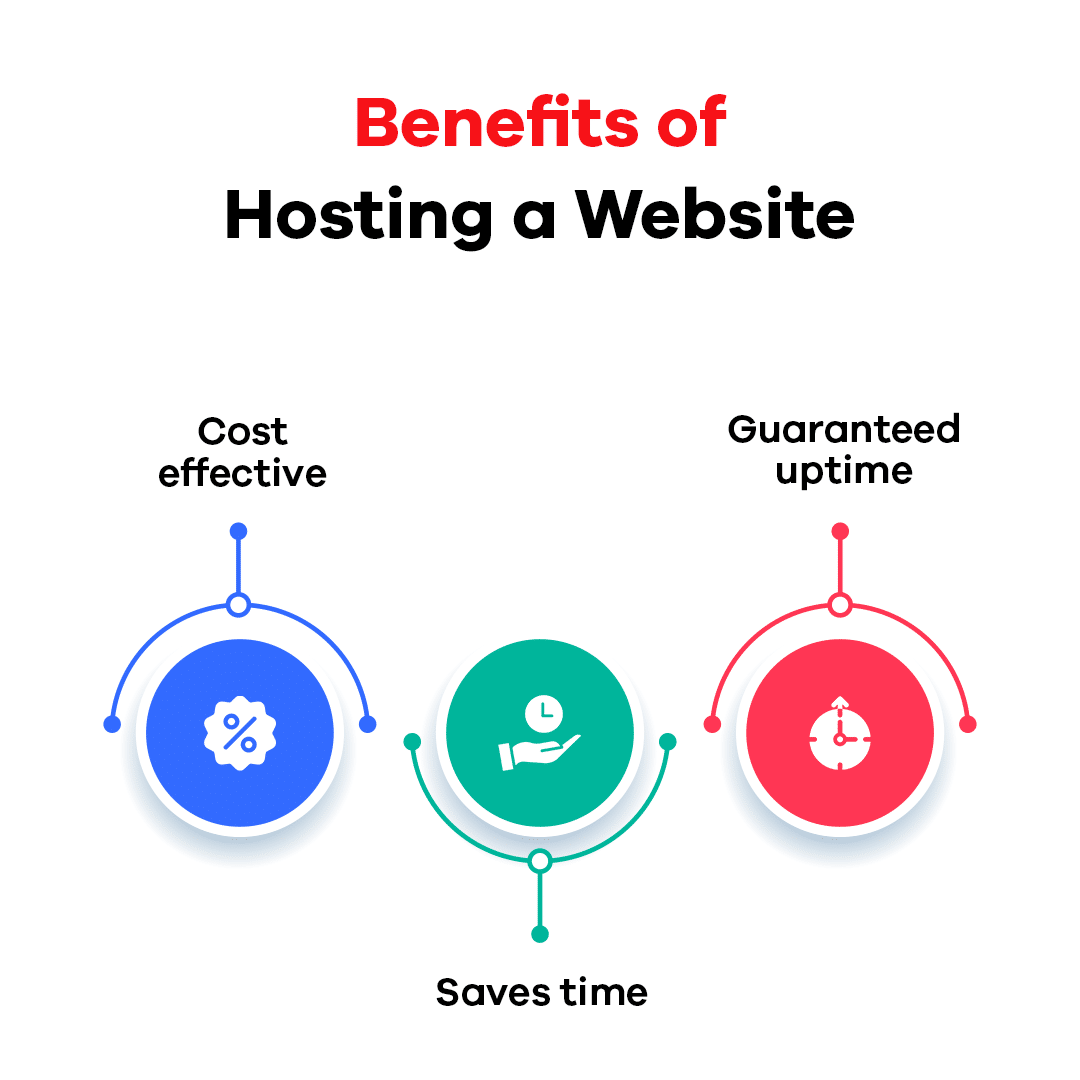
Gradually, people are now getting to understand the advantages of choosing a web host over how to host a website for yourself. It is a more convenient and hassle-free way of maintaining and running a website. Web hosting has a variety of benefits for website owners, and here are some of these:
1. Guaranteed uptime
Most web hosting companies offer a guaranteed uptime. This indicates the percentage of times when the website is sure to be up and running for the customers to use and view. For example, if a web hosting company guarantees a 99.9% uptime guarantee, it is certain that only 0.1% of the time, your website might be down because of technical issues. This ensures that the website is available at all times, meaning there is less loss of consumers for the website owner.
2. Cost-effective
Investing in a web hosting company can prove to be much cheaper than other available options. Physical hardware and software can be difficult to install, and their maintenance charges can be very high. Moreover, an organization might need to have specialists to run or develop the servers. In comparison to this, a web hosting company is a more economical choice.
3. Saves time
Web hosting companies can save website owners a lot of time. There is no need to hire additional employees or train them. Furthermore, there is no need for website owners to spend time on the installation or maintenance of the servers. Since servers run 24*7, web hosting guide can demand a lot of time.
Different web hosting types have different advantages, depending on what the website owner is really looking for. However, all types definitely save time and are proven to be more cost-effective in most cases.
Disadvantages Of Web Hosting
Although web hosting is a must for websites today, there are several cons of using these services as well. The first challenge one might go through is how to choose the right web host. The initial understanding of web hosting might be complicated, but it is important to factor in the drawbacks of web hosting as well. Here are some of these:
1. High cost
The initial cost of hiring a web host can be higher than a website owner might expect. Although this cost might be high, it might be useful for the website in the long run. A few web hosting types like dedicated hosting might be more expensive than other types like shared hosting. However, the cost depends on the traffic that the website gets, and the requirements as well. In the case of dedicated server hosting, it is more expensive because the website owner has complete charge of the server, and can get any kind of customization implemented.
2. Initial research
For a beginner, it might be overwhelming to see so much information on the internet. Information about the different kinds of web hosting, as well as the different web hosting companies, can be intimidating. Therefore, initial research can be tiresome. However, this research is extremely important and can form the backbone of a good website.
3. Loss in productivity
Some kinds of web hosting can lead to a steep loss in productivity. In the case of shared web hosting, this loss in productivity might be because of other websites sharing the same server. In other cases, the loss could be due to negligence in research or if the website owner does not understand the features of the package taken too well.
If the initial research is not done thoroughly, there is a huge possibility of incurring a cost that is higher than usual, or a loss in productivity. Since all of these are interconnected, it is crucial that the website owner is careful every step of the way.
Types Of Web Hosts
There are different kinds of web hostings, but the most popular are shared hosting, dedicated hosting, and VPS hosting. The type of web host that you choose will depend on multiple factors including, your business intention – do you plan to expand it eventually? Is your website only for informational purposes? What is your current scale of operations? What level of security do you need?
5 Types of Web Hosting
Here, we’ll discuss the 5 popular types of Web Hosting:
1. Shared Hosting
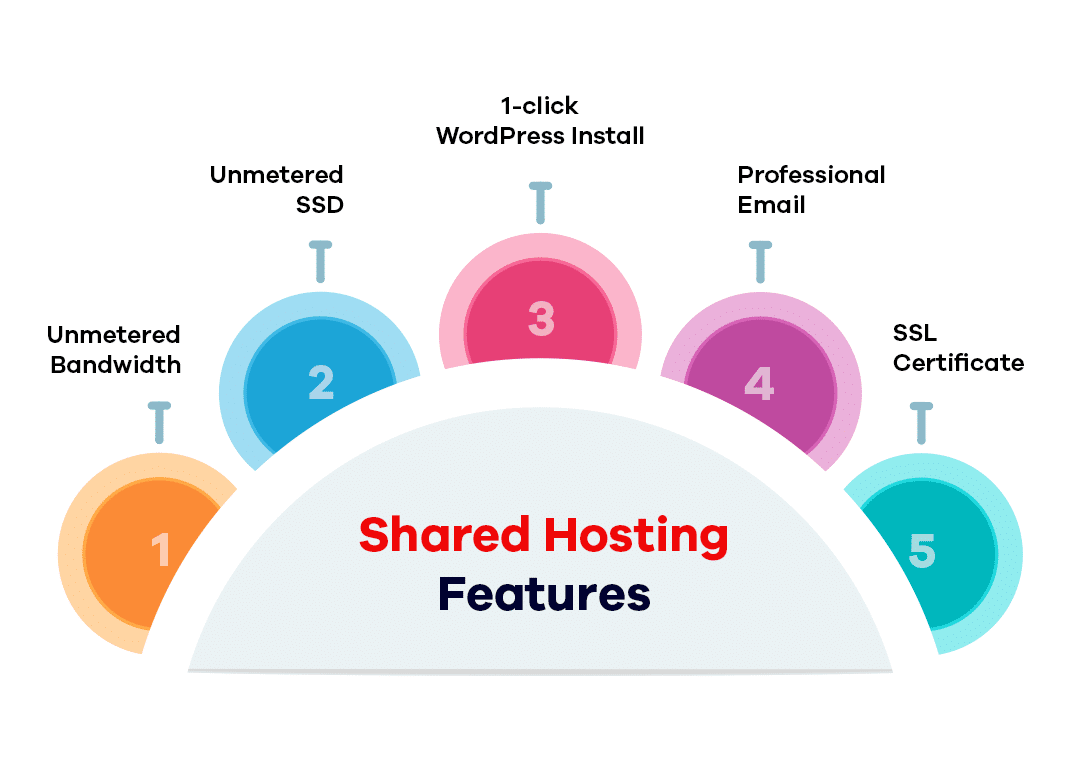
This is relatively the cheaper option. Shared hosting comes with several basic features like email and WordPress. These are tools that enable a website owner to easily run a website. These facilities are shared by multiple websites. Hence, a single website on the server can also affect the others. This implies that if one website drives heavier traffic than the others, it might affect the speed of the other websites on the server.
2. Dedicated Hosting
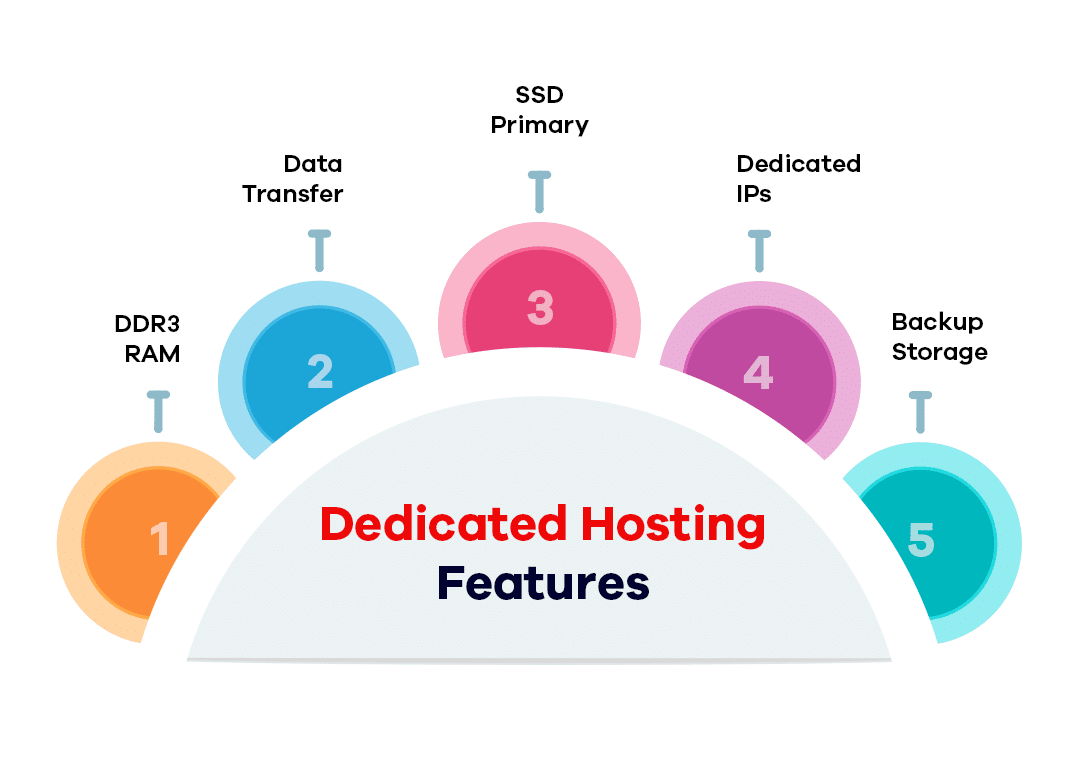
A dedicated web host is when the website owner has complete control. The features can be customized according to the website’s requirements. These are often used by bigger businesses with multiple websites. Although these might be more difficult to manage, they are still more powerful than other types of web hosting guide services. A huge amount of space is available, allowing more customers to the website.
3. VPS

Virtual Private Servers have more room, more space, and more control as compared to a shared hosting service. Some features like processor, web updates, and file uploads are shared by websites, but there are fewer websites in this case. If a single website gets more traffic, this is a recommended service.
4. Hosting for WordPress
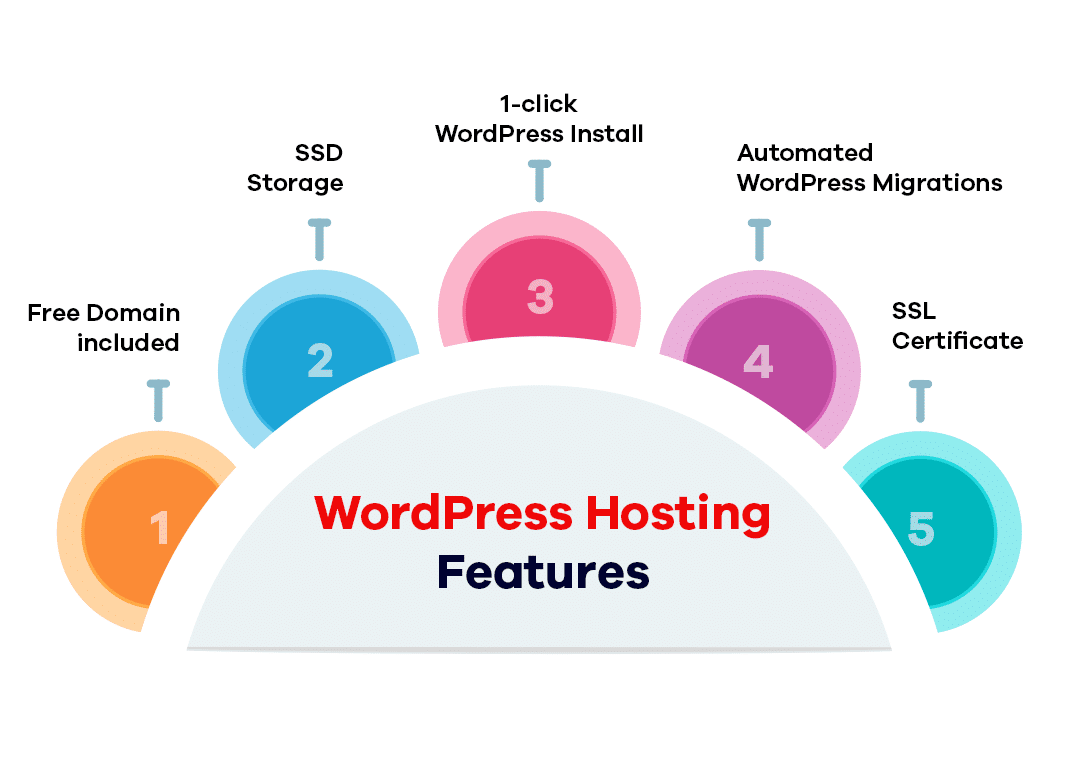
WordPress is a common term today, especially for bloggers. It is a widely used content management system and is crucial to website creation. A website can use either shared Hosting for WordPress or VPS Hosting for WordPress. It is recommended for WordPress websites and is optimized for them.
5. Cloud Hosting
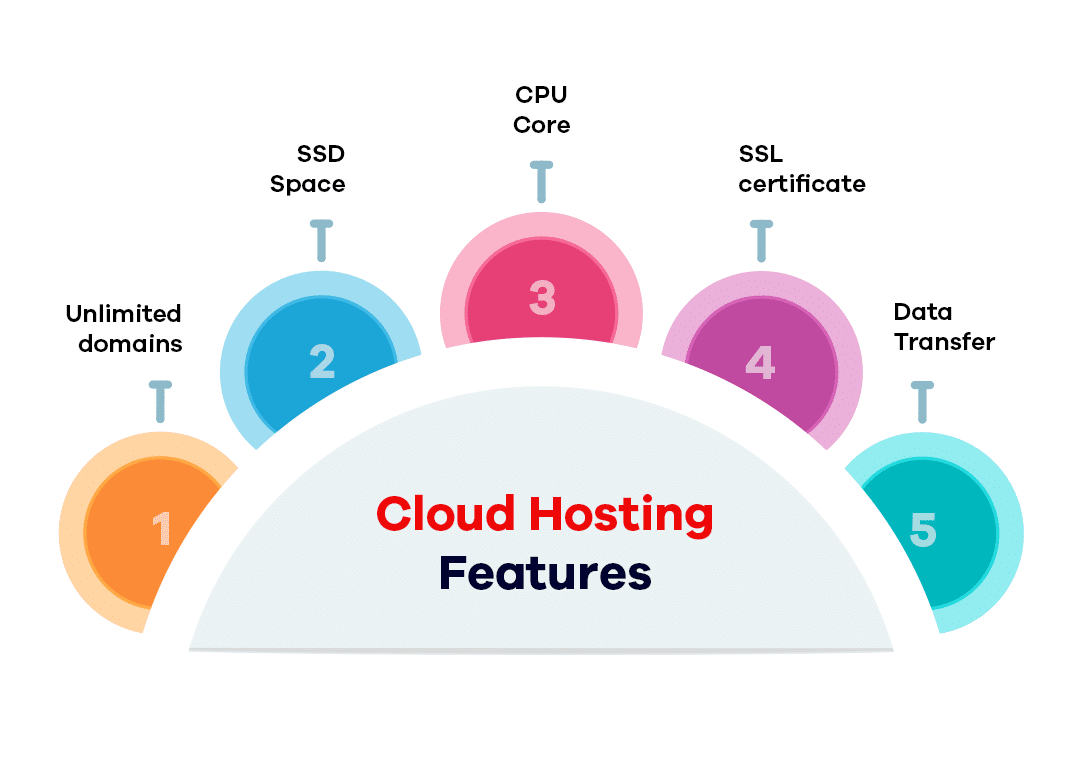
Cloud hosting is a type of web hosting that is completely online, implying there is no need for hardware. Essentially, cloud resources are widely used for this type of hosting. It makes it easy to instantly allocate resources to websites are is a faster way of web hosting.
A web hosting company might offer different types of hosting services – shared hosting, managed VPS hosting, dedicated hosting, managed hosting for WordPress, and more. Each of these has its own features. It might be helpful to step back and look at the practicality. For example, if one needs development assistance, then shared hosting might be a good choice.
Important Elements Of A Good Web Hosting Company
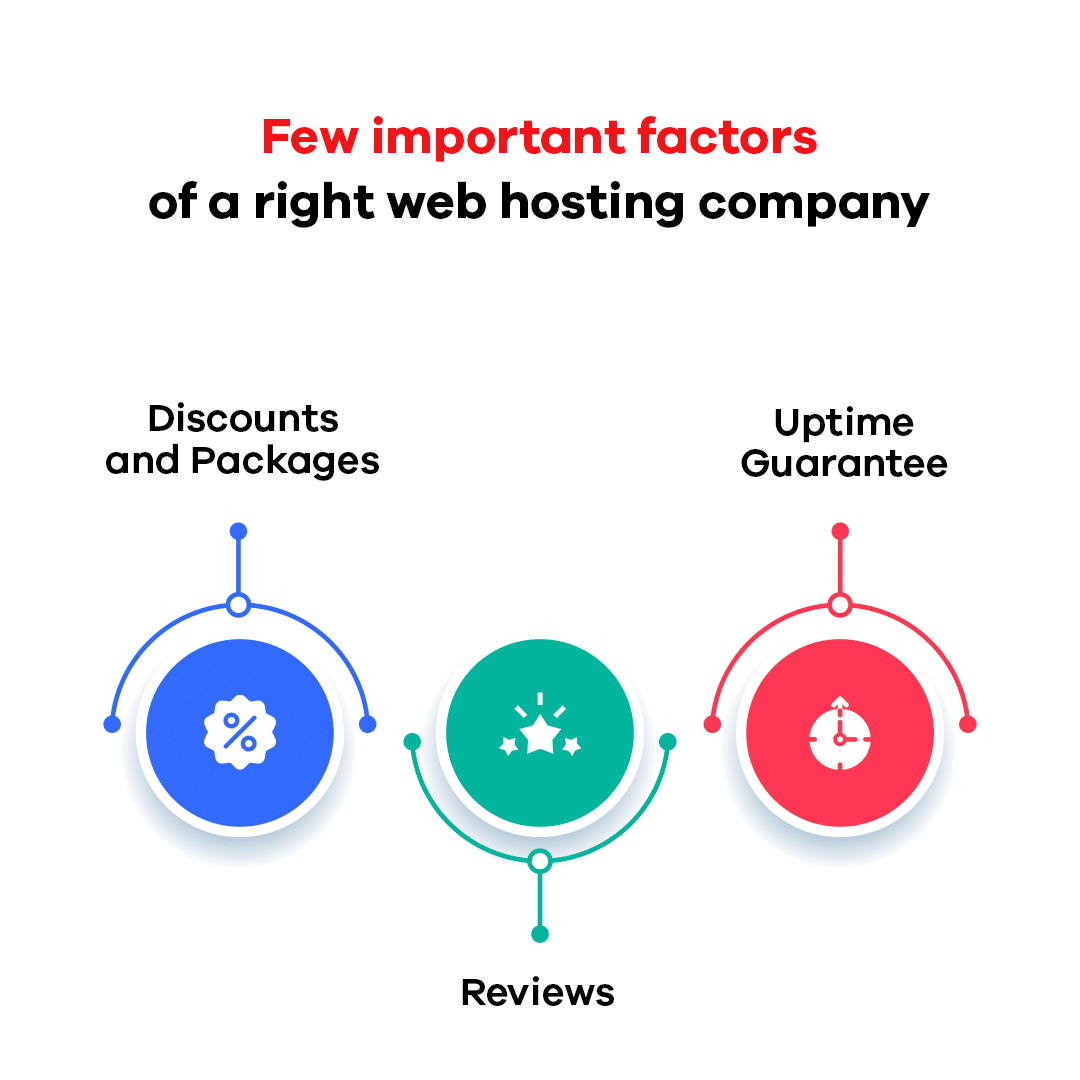
When a website owner is looking at engaging with a web hosting company, there are several non-negotiable elements taken into account. Here are some important factors one should consider before choosing a web hosting company:
1. Discounts and Packages
The web hosting industry is very competitive, and so web hosting companies need to offer good discounts and packages to their clients. These deals can often be found on different web hosting directories. Web hosting plans are generally different for single websites, premium websites, and businesses with multiple websites.
3. Reviews
Established web hosting companies have many experienced users and customers. These customers usually give their reviews about the companies online, highlighting both the positives and negatives. A new user can get a fairly good idea about the web hosting company through reviews, which can generally be found on web hosting directories.
3. Uptime Guarantee
A good web hosting company will have a higher uptime guarantee. More popular web hosting companies offer you an uptime guarantee of more than 99.5%. The higher the uptime guarantee, the better it is for a website.
These are only a few out of the many other features one might want to consider before zeroing down onto one specific web hosting company. Others include speed, reliability, and security. Additionally, customer service and other add ons can also play a role.
Main Factors To Consider While Choosing The Right Web Host
Choosing a good web host can be tricky. There are several things to consider before investing a high amount in one web hosting company. If the web hosting company is not chosen well, it can break the deal for the website, making the website absolutely unsuccessful. Here are some steps to follow while choosing or shortlisting between the best web hosting companies.
1. Understanding the purpose of the website
Analyzing the website’s nature is the first and foremost step. It helps a user understand the industry better and predict the traffic that the website might attract. The web hosting type can be chosen according to this. For example, if the website is an e-commerce platform, then shared hosting could be a more cost-effective option.
2. Initial Research
There are thousands of good web hosting companies out there. However, each of these offers something unique. The website owner needs to set priorities for the website – is it saving money or attracting more customers? According to this research, the right web hosting company can be chosen.
3. Understanding the market
The market is extremely populated, with millions of websites and thousands of web hosting companies. It could be helpful to study other similar websites and see what they are using, what is working for them, and what they could improve on. Using these insights for a new website could take the website a long way.
4. Reading Reviews
Web hosting directories offer various web hosting blogs for beginners to understand the market. These include reviews from existing and experienced customers, industry experts and researchers. It might give newbies good tips and tricks to start off and survive in this industry.
There are questions that one might need to ask – Is the web hosting company package within a specified budget? Would the website owner want assistance or is he willing to figure things out by himself? Are development tools needed? Once these questions are answered, choosing a good web hosting company can be made easier.
3 Efficient Ways To Choose The Right Web Host
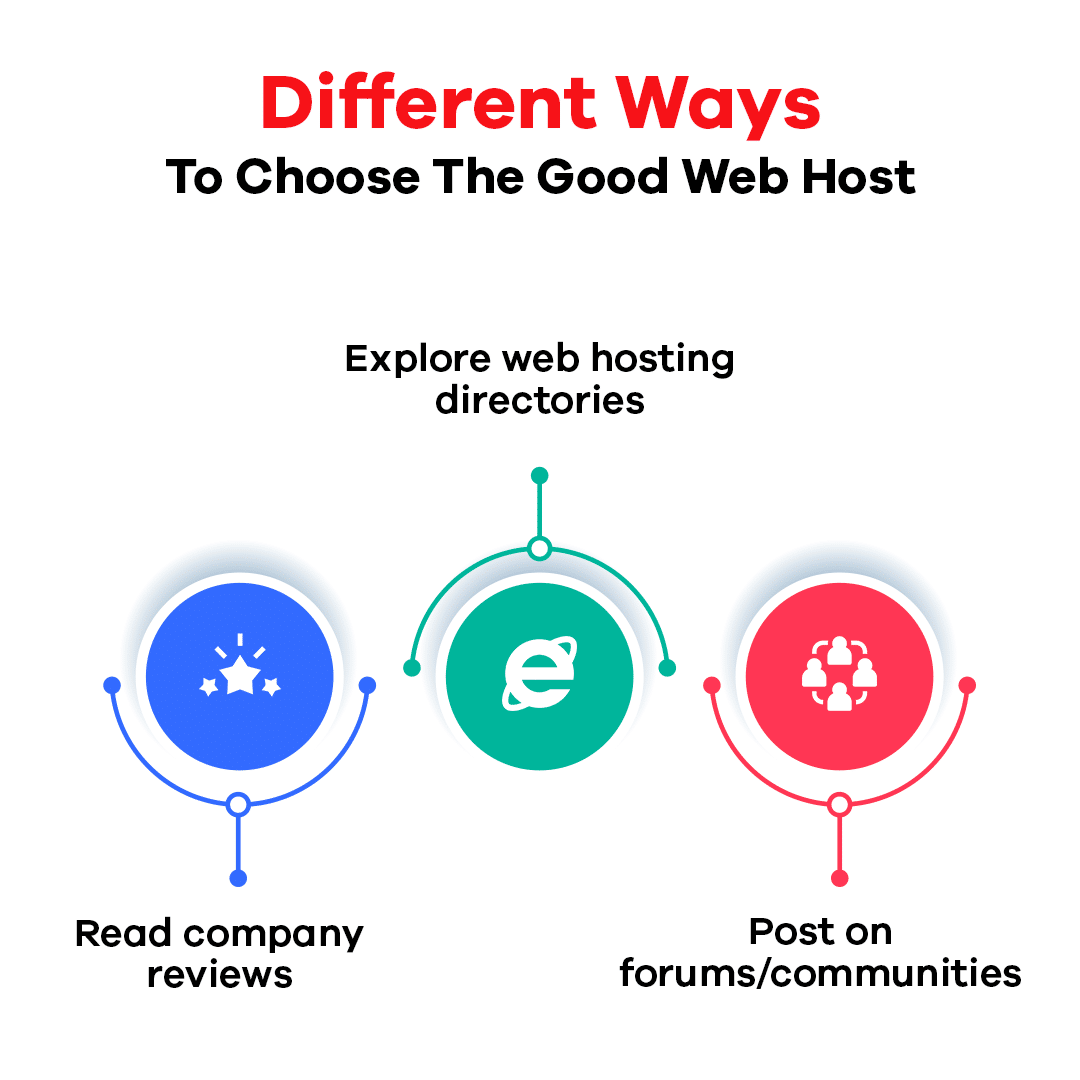
To get started, it is important to know the right ways to choose the right host. If this is sorted, it is easy to select the web hosting company and not get fooled by the variety of packages they have to offer. Here are some of the best ways to explore the industry:
1. Explore Web Hosting Directories
Web hosting directories like HostingSeekers, give a detailed idea about the different web hosting companies in the market. This is a great place to compare different web hosts, with respect to their features and prices. Moreover, these directories also have genuine reviews from verified customers. With blogs written by experts, it is not only a good way to understand companies but also for companies to promote themselves.
A web hosting company can register themselves on these directories, maintain their profiles, and understand the perspective of customers. On the other hand, customers can register themselves and get access to good packages. Several web hosting directories also offer information on which web hosting companies are working well in which countries. This helps website owners to choose companies according to their target audience.
2. Read company reviews
It is common for a customer to go online and read reviews before investing time and money in any company. Positive reviews automatically make a customer trust the company more, especially if it is a local company.
On the other hand, if a company has negative online reviews, new Year will hesitate before putting their money in.
3. Post on Forums/Communities
The industry has millions of people, and a lot of them deal with similar issues while starting out. It might be helpful to post questions on forums to know their views and opinions on several issues. Moreover, one can also learn from mistakes that peers might have made in the past. Networking within the community might be a great way to understand these people as well as the industry better.
After deciding how many hands holding one might need, and understanding the different types of servers, these are some key web hosting steps to follow. These might turn out to be efficient and are crucial to one’s success.
Important Terms Related To The Web Hosting Industry
IP Address
IP stands for internet protocol and an IP Address is a unique digit code that is given to your server. Every website host also has an IP address. This distinguishes it from other websites and servers. While every host has an address, websites will only have separate addresses if these are hosted alone using dedicated web hosting services.
Domain Hosting
A website needs both domain hosting and web hosting to run. The domain hosting services sells domains and register them on a yearly basis. Domains help direct customers to a certain website and are generally attached to a specific IP address. It is always easier to share and remember a domain name than an IP address.
CPU
CPU stands for Central Processing Unit and is generally more commonly spoken about in cases of shared web hosting guide. Every server has a CPU and can affect the website or multiple websites on that server. In the case of shared hosting, multiple requests are made to a single CPU which is shared by all the websites. These requests are not answered all at once, and so might make the website slow. In the case of a dedicated server, there is a dedicated CPU. This automatically implies that the website is faster.
RAM
RAM stands for Random Access Memory and is a space where data can be stored temporarily while other processes are running. It is recommended that websites have anywhere between 512 MB to 1 GB RAM, for smooth operations. The more processes that run simultaneously, the more RAM the server will need.
DNS
DNS stands for Domain Name System and is used to easily translate domain names into IP addresses. While domain names are easier for humans to read, understand and remember, IP addresses are used by systems. This enables servers to download the data that is stored in their systems.
Where does the Web Hosting Industry Stand Today?
The web hosting industry has seen a huge spike in the last couple of years and is expected to grow continuously for the next few years.
Spike in users
As of 2021, there are about 1.21 billion registered web hosting companies. GoDaddy is a popular web hosting Guide company, with the highest share of about 44 million subscribers. However, WordPress as a web hosting type is growing fast, with Bluehost taking away the highest market share of 1.96 million WordPress websites.
Fast-paced
It is a fast-paced industry, with trends changing often. With major technological advancements year on year, it is definitely a challenge for web hosting companies to keep up with these changes.
Local web hosting companies
Interestingly, while these popular companies are known globally, some countries have local web hosts that have a good market share as well. For example, Norway, Switzerland, and Japan have seen the growth of local web hosting companies because of heavy investments from the government in the industry.
Web hosting is a fast-paced industry, with trends changing often.
Where is the Industry Heading?
The advent of Covid-19
With the advent of Covid-19 in 2019, several small and medium-sized businesses were negatively impacted. However, it was not surprising that most businesses had to go online to survive and thrive. According to a McKinsey report, 80 percent of business interactions are now digital in nature. This was a plus for the web hosting industry. There was not only the creation of more websites but also more traffic driven towards these websites. The influx of newbies in the industry only boosted the competition, pushing companies to do the best they could.
More internet users
While people are getting used to the work-from-home lifestyle, the industry is only going to see a rise in the next few years. Although this might be an advantage for the industry, there are more security issues, more competition, and better adaptation techniques to new trends that the industry might have to face.
Conclusion
In today’s digital world, it is impossible to work without the internet. This makes web hosting a big and constantly growing industry. With the various types of web hosting, there is something for everyone. Although the industry might look intimidating at first, plenty of relevant information is available online. It is easy for a newbie to understand the industry and get started. With the various changes, however, it is difficult to predict how big and successful the web hosting empire will be in the coming few years.
Frequently Asked Questions
Q. What exactly is Web Hosting?
A. In simple terms, web hosting is a service that lets a website owner upload files on the internet for public view. It is only because of web hosting that a website is live. There are different types of hosting that are chosen based on different factors like the budget and requirements.
Q. Is Web hosting free?
A. There are both free and paid web hosting available. For a free web hosting guide, it is generally shared web hosting which means the resources are shared between different websites. Paid hosting, however, enables the website owner to customize and take control of what is happening on the website.
Q. Is GoDaddy a web host?
A. GoDaddy is a popular web host. GoDaddy has the highest market share in the industry and provides four types of web hosting – shared, dedicated, VPS, and WordPress.
Q. Which are the best web hosts in the UK?
A. The top web hosts in the UK are Hostinger and Siteground. While Hostinger UK is ranked top for the overall value they provide to the customer, Siteground is more renowned for providing premium services to users.
Q. Which are the best web hosts in the USA?
A. In 2021, BlueHost and Hostinger were best known in the USA. BlueHost currently hosts over 20,00,000 websites and is known for the low-cost packages they offer. Hostinger offers an average uptime of 99.99% which makes it popular amongst users.
Q. Which are the best web hosts in Canada?
A. HostPapa is the most popular Canadian web host, with prices starting at $2.95 a month. Headquartered in Canada itself, they offer some essential features for free too.




